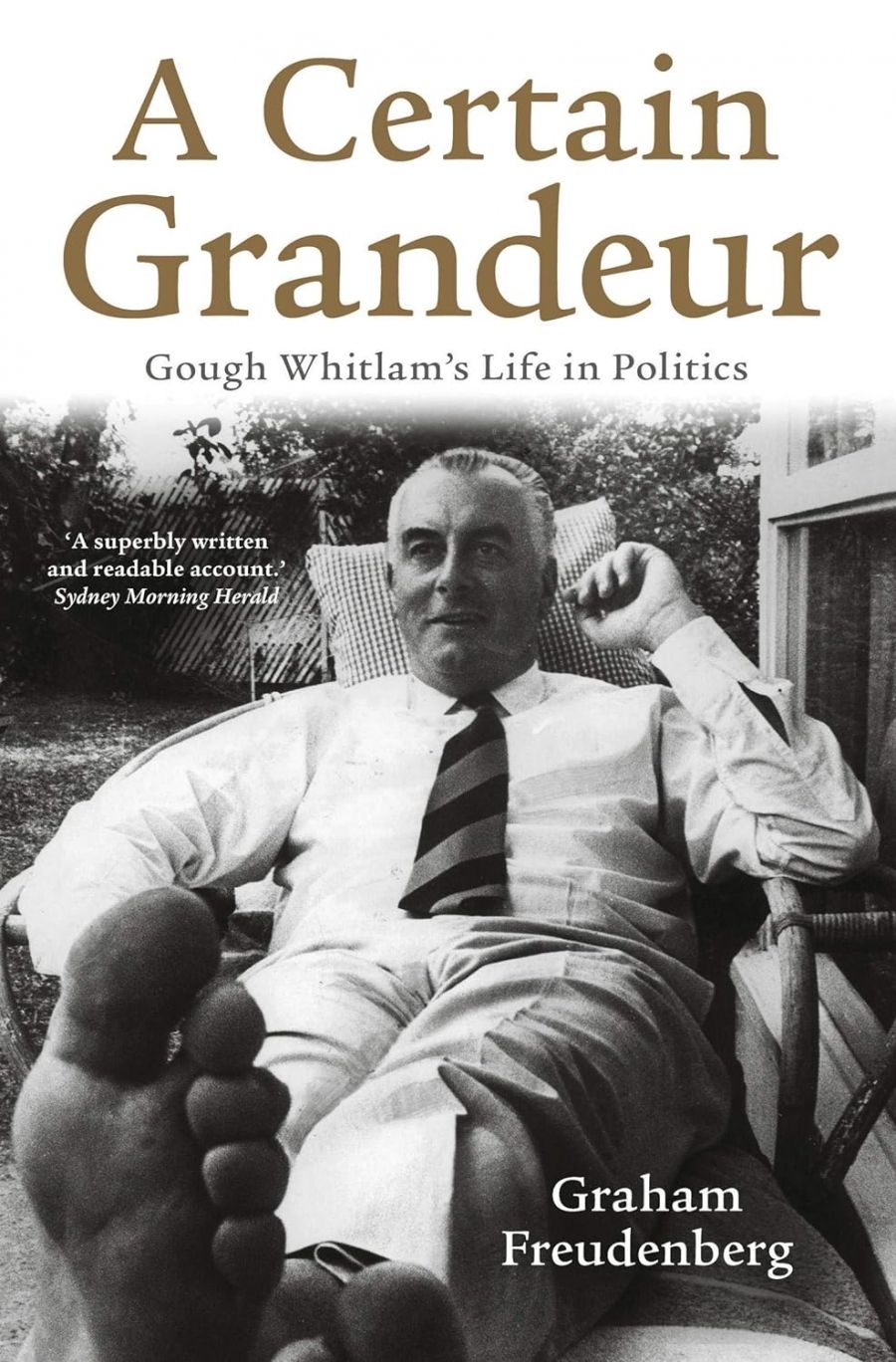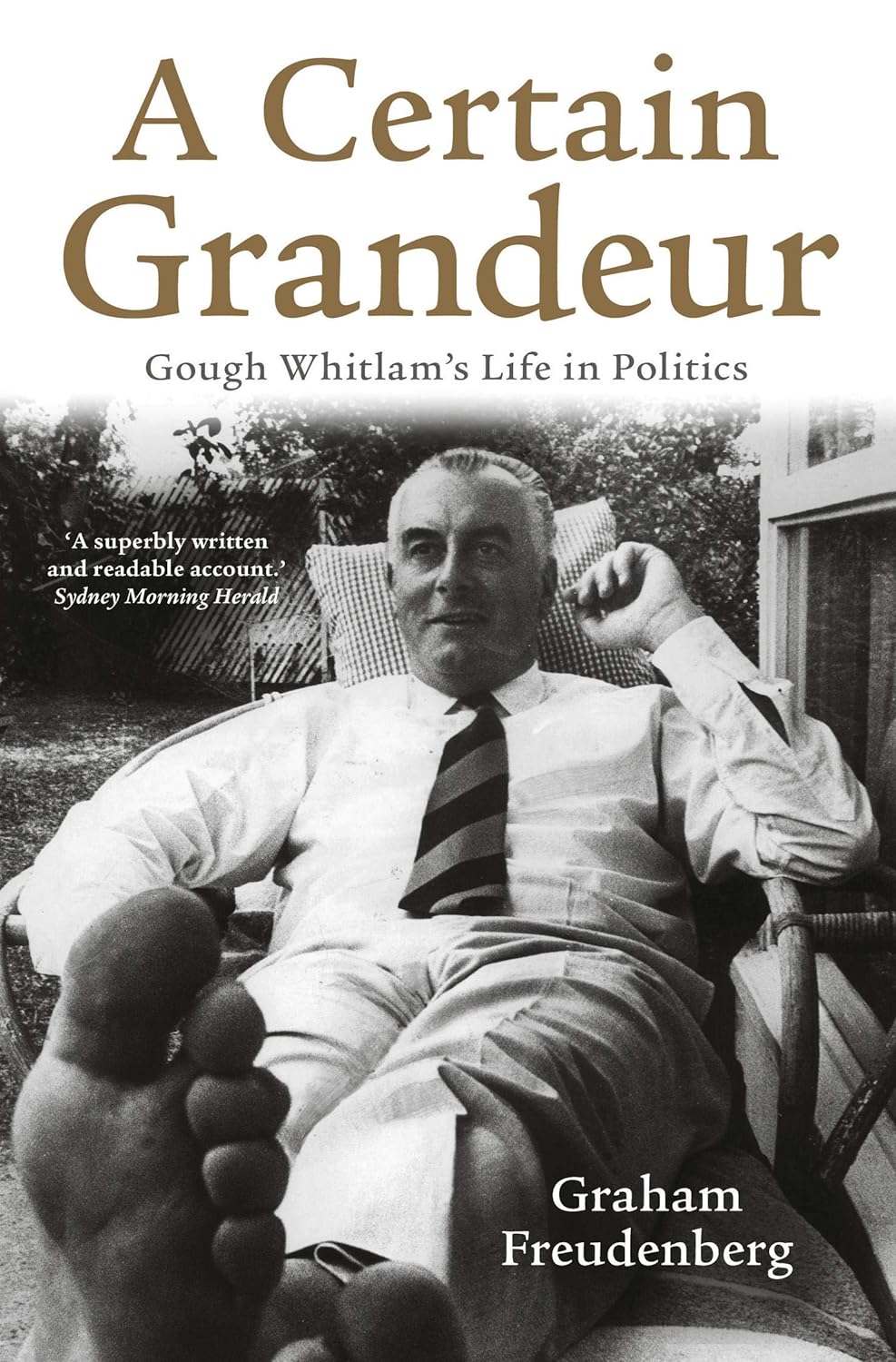
- Free Article: No
- Contents Category: Biography
- Review Article: Yes
- Article Title: Too inspissated, too dithyrambic
- Article Subtitle: Seismic times for Whitlam’s speechwriter
- Online Only: No
- Custom Highlight Text:
Gough Whitlam’s 1972 policy speech, delivered before a crowd of thousands at the Blacktown Civic Centre in a scene that bore a closer resemblance to a pop concert than to a political campaign, is seen as the ultimate articulation of the Whitlam Labor government’s radical program for change. If its chief political architect was Whitlam, its amanuensis was Graham Freudenberg. With Whitlam’s election as leader of the Australian Labor Party in 1967, Freudenberg eagerly joined his staff as press secretary, a position he had previously and less happily held with Arthur Calwell, who was leader from 1960 to 1967.
- Book 1 Title: A Certain Grandeur
- Book 1 Subtitle: Gough Whitlam’s life in politics
- Book 1 Biblio: Viking, $35 pb, 486 pp, 9780670073757
- Book 1 Cover Small (400 x 600):

- Book 1 Cover (800 x 1200):

In a career of unusual longevity and breadth, Freudenberg’s speechwriting has been indispensable to generations of Labor leaders, premiers and prime ministers from Calwell to Whitlam and Bob Hawke, and from Neville Wran to Barry Unsworth and Bob Carr. But it is for his role in both the development and the public expression of the Whitlam government’s reformist program that Freudenberg is best known. His speeches brought Whitlam’s detailed policy expositions to life and were crucial in their gaining popular support – the much-vaunted mandate for change. Whitlam recognised their complementarity well: ‘The trouble is, Comrade, that I’m too inspissated and you’re too dithyrambic.’ As Freudenberg reports, ‘I reached for the dictionary, and then agreed!’
In this most significant relationship, spanning nearly half a century, Freudenberg was to become much more than Whitlam’s speechwriter and press secretary. Particularly during their years in Opposition, Freudenberg was a respected political adviser who was able to speak his mind and even counsel Whitlam when others held back. It was a rare congruence that reflected Freudenberg’s own passion for, and belief in, what is now known as ‘Whitlamism’ – equality of opportunity, one vote one value, Australian independence within a broader internationalism – and a fervent belief in the Australian party system and parliamentary democracy as the institutional means for achieving reform.
As each became utterly attuned to the other, so much so that not only the speeches but Freudenberg himself began to adopt the cadences, language and manner of his formidable leader, Freudenberg’s mother drily remarked: ‘Well, they do say dogs get to look like their masters.’ Nevertheless, it would be wrong to see this political and literary interaction merely as a case of ‘his master’s voice’, for Freudenberg’s style is as spirited and passionate as Whitlam’s is laboured and insistent. Compare A Certain Grandeur (first published in 1977) to Whitlam’s own The Whitlam Government (1985) – vastly different in style and content, yet each essential to understanding Gough Whitlam and the Whitlam government.
Freudenberg was never merely a disinterested pen-for-hire, but was himself an integral part of the passions and characters that animated Australian politics at that time – ‘three of the most tumultuous, exciting and creative years in Australian history’. Freudenberg also recognises that, ‘The passions and emotions of the time are fundamental to any understanding of the events that generated them’; and with this new edition of his classic, A Certain Grandeur: Gough Whitlam’s Life in Politics, those passions are revived for a new generation.
This edition contains two new chapters: on Whitlam’s post-government term as ALP leader and on the continuing controversy surrounding his government’s policy on East Timor, together with a brief assessment of the legacy of the Whitlam government more than thirty years since its dismissal by John Kerr on 11 November 1975. In all other respects, the book is as it was when first released in 1977, and this immediacy is its great strength, for this is Freudenberg’s story as much as Whitlam’s, and it is a story of their time.
In telling Whitlam’s life in politics as an ardent participant observer, Freudenberg draws together the intersecting elements of Whitlam’s own political development, Robert Menzies’ conservative political and social dominance and the Labor Party’s hopeless slide into recrimination and rupture, culminating in the near-fatal trauma of the 1955 Split. But it is with the slow rejuvenation of the party around the modernisers led by Whitlam, and the optimism generated by the determined path to party leadership and government, that A Certain Grandeur excels.
Its cast of peculiarly Australian mavericks, believers and idealists would hardly seem out of place in a political thriller. What fiction could ever dream up Labor firebrand Eddie Ward, chasing Whitlam through the corridors of Old Parliament House, desperately swinging punches at his retreating frame? Ward later said: ‘I knew my health was failing when I took a swing at Gough Whitlam and missed!’ Labor history is full of these marvellous, diverting but ultimately poignant moments, stories that are less about personal animosities than about the deeply held political positions they represent: the White Australia Policy, State aid to non-government schools, the party’s position on the Vietnam War and conscription. During this trajectory from Opposition to government, Whitlam faced two great battles: to restructure the Labor Party and its platform, and to take the party to a successful election. The inevitable tensions could be seen in periodic expressions of the legendary Whitlam temper – a glass of water thrown over Paul Hasluck in parliament, telephones hurled through windows, chairs flying through the office door. The methodical preparation for every speech, the reliance on statistics, sources and argument combined with a biting tongue and coruscating wit to make Whitlam the only parliamentary performer capable of matching Robert Menzies. At the same time, Whitlam’s formidable language and general knowledge – and his delight in using both – created lasting enmities within his own party and beyond.
Freudenberg is at his most compelling when tracing this political trajectory. The absence of any mention of Whitlam’s membership of the 1956 Parliamentary Joint Committee on Constitutional Review is strange; Whitlam considers this one of the most significant influences in his political development. It was a transformative experience for him, revealing the creative potential in the Constitution for the implementation of Labor policy and overturning the deadening pessimism of so many in the Labor Party who still held that Labor policies were constitutionally impossible. ‘I went from the despair of Section 92 to the confidence of Section 96,’ Whitlam later said, and the Labor Party eventually went with him.
The most substantial new material in this edition concerns Timor, surely the most contentious and the least clear-cut of the many aspects of the Whitlam government. It is a political miasma rent by the deaths of five Australian journalists at Balibo, killed by Indonesian forces making an incursion into East Timor, in the weeks before John Kerr’s dismissal of the Whitlam government. In Freudenberg’s view, this horror has become a distorting prism – ‘the murders at Balibo impaired Australian understanding of how Timor’s long tragedy happened and why’ – and his task has been to unravel these connected, confusing strands. A Certain Grandeur traces this tragedy from its antecedents in colonial Portugal’s reluctance to decolonise, through successive Australian conservative governments’ shared view of the ‘practical’ inevitability of incorporation into Indonesia, to Whitlam’s own entrenched position on decolonisation, his equally long-standing disparagement of Portugal as a colonial power and his qualified acceptance of the incorporation of Portugese Timor into Indonesia – arising from the ‘properly expressed wishes of its people’. As the process of decolonisation collapsed into civil war, Fretilin, on 28 November 1975, declared itself to be ‘the sole authentic voice of the Timorese people’. One week later, Indonesian forces invaded Dili.
The fascination that continues to surround this period is due mainly to the political asymmetry of the hope and vision of the Whitlam government’s program for change and the manner of that government’s demise. The Dismissal has become an iconic political moment, spawning T-shirts, posters, mugs and ‘the Dismissal tour’, one of the most popular at the new Museum of Australian Democracy, formerly known as Old Parliament House. Yet behind the sorry story of intrigue, deception and arrogance, all too often forgotten are the people whose personal and professional lives and whose years of hard work were cut short with the stroke of a pen. Reading this story once again, the anti-democratic sentiment that pervades it all is shocking. The insouciance of Malcolm Fraser’s willingness to replace a government twice elected by the Australian people in the previous three years – the most recent barely eighteen months before – and Kerr’s cavalier suggestion that Whitlam could simply come back at the next election now seem almost surreal. Politics had become little more than a game in which the institutions mattered little and people even less. These personal stories, of passion and commitment, have remained obscured in the vast and polarising literature on the Dismissal; they take centre stage in Graham Freudenberg’s grand story.


Comments powered by CComment